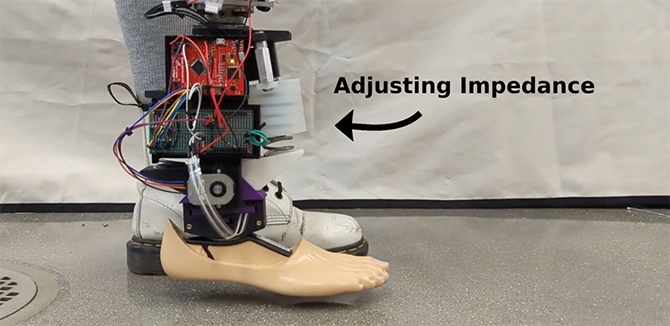Creating a Prosthetic Ankle From Scratch
Liz Metzger wanted the chance to create a medical device that could help change lives. The MSR program’s final project gave her the opportunity to do just that.

Liz Metzger (MSR ‘23) earned her undergraduate degree in biomedical engineering with an emphasis on medical devices. To enhance her knowledge, she wanted an opportunity to gain hands-on experience creating a potentially life-improving device.
She seized that opportunity with the help of Northwestern Engineering’s Master of Science in Robotics (MSR) program.
Metzger worked closely with associate professor Matthew Major from Northwestern's Feinberg School of Medicine to develop an advanced prosthetic ankle from scratch. The device, known formally as a dynamic impedance prosthetic ankle, allowed her to display the skills she learned throughout her time in the MSR program.
“It was great to have an opportunity to work on a project in a field that I had so much ownership of,” she said. “The whole project seemed like a massive challenge with the potential to really impact the quality of life for a lot of people.”
About 150,000 people in the United States undergo a lower extremity amputation each year, according to the National Institutes of Health. Among the most common causes are diabetes, vascular disease, and trauma from accidents.
The biggest challenge Metzger faced was getting started.
“It was hard to come up with a mechanism I felt confident in when there wasn't a starting point,” she said. “It felt like there were an infinite number of ways to accomplish what I was trying to do.”
What she tried to do was bridge the gap between low-cost, basic prosthetic limbs and high-cost, highly mechanical versions that often are bulky and obvious to the casual observer.
"This project would not be possible without MSR's ties to the medical school," said MSR co-director Matthew Elwin. "Not only does Professor Major's lab have the testing equipment needed for a project like this, but it also has the clinical expertise and knowledge required to conceive of and specify the problem that Liz was tasked with solving."
Metzger’s mission to find a relatively low-cost but highly mechanical prosthetic device that closely mimicked the movement of a real ankle joint placed severe limitations on the type of material she could use. Because of the work she did before starting the actual robotics-creation portion of the project, Metzger was able to quickly evolve her idea through prototype testing.
The result was a functional version of an ankle joint that is now beyond the proof-of-concept stage. Metzger said she plans to stay involved in further developing the idea after her MSR graduation.
“I ended up making more progress than I thought I would at the start and showed experimentally that my device behaves as expected,” she said. “I intend to help whoever works on this project next with any questions they have about the work that I did.”
Metzger credited MSR with preparing her to succeed with her final project — and beyond.
“The most important thing I got out of this was a lot of confidence in my ability to design, solve problems, and overcome obstacles,” she said. “I learned that, when faced with a challenge, I have the skills and the resources to break it down and solve it.”
Because of her own experiences in the program, she strongly recommends it to those looking to boost their robotics skills and career trajectory.
“This program really works,” she said. “If you have any gaps in your knowledge, this is the place to come to fill them and expand the knowledge that you already have. You will leave Northwestern exceptional at what you do, and it's evident to the people who meet you.”

